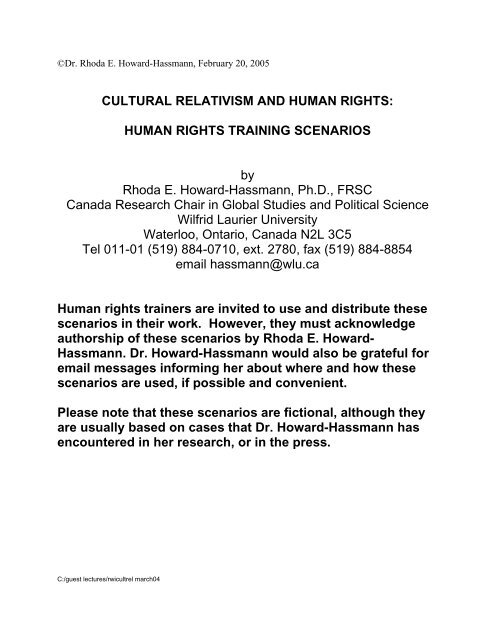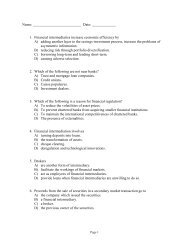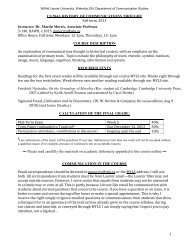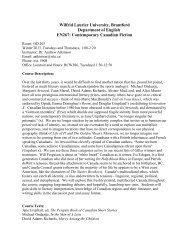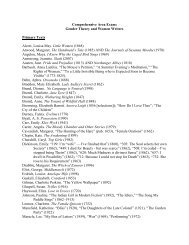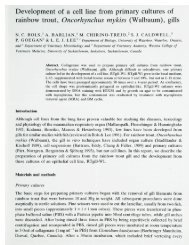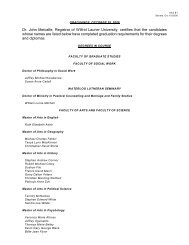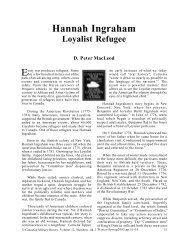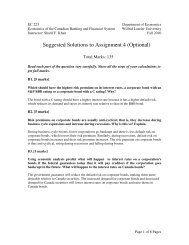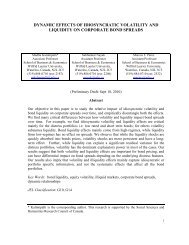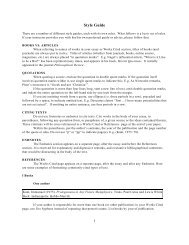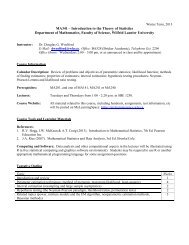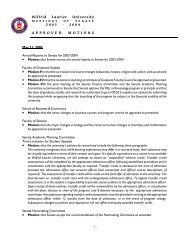CULTURAL RELATIVISM AND HUMAN RIGHTS - Wilfrid Laurier ...
CULTURAL RELATIVISM AND HUMAN RIGHTS - Wilfrid Laurier ...
CULTURAL RELATIVISM AND HUMAN RIGHTS - Wilfrid Laurier ...
Create successful ePaper yourself
Turn your PDF publications into a flip-book with our unique Google optimized e-Paper software.
©Dr. Rhoda E. Howard-Hassmann, February 20, 2005<br />
<strong>CULTURAL</strong> <strong>RELATIVISM</strong> <strong>AND</strong> <strong>HUMAN</strong> <strong>RIGHTS</strong>:<br />
<strong>HUMAN</strong> <strong>RIGHTS</strong> TRAINING SCENARIOS<br />
by<br />
Rhoda E. Howard-Hassmann, Ph.D., FRSC<br />
Canada Research Chair in Global Studies and Political Science<br />
<strong>Wilfrid</strong> <strong>Laurier</strong> University<br />
Waterloo, Ontario, Canada N2L 3C5<br />
Tel 011-01 (519) 884-0710, ext. 2780, fax (519) 884-8854<br />
email hassmann@wlu.ca<br />
Human rights trainers are invited to use and distribute these<br />
scenarios in their work. However, they must acknowledge<br />
authorship of these scenarios by Rhoda E. Howard-<br />
Hassmann. Dr. Howard-Hassmann would also be grateful for<br />
email messages informing her about where and how these<br />
scenarios are used, if possible and convenient.<br />
Please note that these scenarios are fictional, although they<br />
are usually based on cases that Dr. Howard-Hassmann has<br />
encountered in her research, or in the press.<br />
C:/guest lectures/rwicultrel march04
©Dr. Rhoda E. Howard-Hassmann, February 20, 2005<br />
Case #1<strong>CULTURAL</strong> <strong>RELATIVISM</strong> <strong>AND</strong> WOMENS <strong>RIGHTS</strong><br />
FATIMA<br />
Fatima is 25 years old (meaning that she is legally of age) and<br />
lives in Canada. Her parents were refugees who escaped from<br />
Ethiopia in 1976. Fatima was born in Canada. Although her<br />
parents came from an ethnic group that engaged in female genital<br />
circumcision, her own mother suffered greatly from this operation,<br />
and her parents decided against circumcising Fatima. In any case,<br />
this operation is illegal in Canada.<br />
Fatima has decided to marry Ali, a recent refugee from<br />
Ethiopia. Ali thinks that to be a good wife, a woman should be<br />
circumcised. Also, Fatima thinks that she should be true to her<br />
Ethiopian customs. She has suffered in Canada from being a<br />
member of a minority, and as she grew up she became more<br />
interested in her peoples customs and traditions.<br />
Fatima argues that since she is of age, she should be given<br />
this operation if she wants it. After all, other women in Canada<br />
have operations to enlarge their breasts, or make their faces look<br />
younger. She argues that as a Canadian, it is her right to do what<br />
she wants with her own body. If the operation is performed in a<br />
modern, hygienic hospital in Canada, she lowers the risk of health<br />
consequences considerably.<br />
Should the surgeon whom Fatima has consulted perform the<br />
operation?<br />
Roles:<br />
Fatima, Ali, Fatima's mother, the surgeon, a white Canadian<br />
feminist<br />
C:/guest lectures/rwicultrel march04
©Dr. Rhoda E. Howard-Hassmann, February 20, 2005<br />
Case #2<br />
RELIGIOUS FREEDOM <strong>AND</strong> PROCEDURAL FAIRNESS<br />
RAHIMA <strong>AND</strong> JAN<br />
Rahima is an 18-year-old woman, born in the Netherlands of<br />
Turkish parents. She was not raised to be a religious Muslim, and<br />
her mother does not wear the hijab (headscarf) that some Muslims<br />
think is required of all women in order to maintain their modesty.<br />
Rahima has lately become interested in her Islamic background,<br />
and she has decided to wear a complete hijab, fully covering her<br />
face.<br />
Rahima has a bus pass, to get to and from her school. She<br />
had her bus pass picture taken a few months ago, when she was<br />
still revealing her face. She has been using this bus pass without<br />
any problems, but this morning, when she got onto the bus, Jan,<br />
the driver, rejected her pass. He said that he could not see her<br />
face to check against her bus pass, so he could not let her on the<br />
bus. He asked Rahima to uncover her face to let him see it, but<br />
she refused. She said she would only uncover her face to a<br />
woman. Ilse, a woman on the bus, offered to step off and check<br />
that Rahimas face matched her bus pass, but Jan refused.<br />
Roles:<br />
What should Jan have done?<br />
Rahima, Jan, Ilse, a bus company official, aTurkish community<br />
representative<br />
C:/guest lectures/rwicultrel march04
©Dr. Rhoda E. Howard-Hassmann, February 20, 2005<br />
Case #3 INDIVIDUAL <strong>RIGHTS</strong> VERSUS GROUP CUSTOMS<br />
EFUA<br />
Efua is an African woman living in her husbands village.<br />
Under the customary law of her and her husbands ethnic group,<br />
children belong to the fathers family.<br />
Efuas husband has recently died. Her husbands younger<br />
brother has offered to marry her, even though he already has four<br />
other wives. If Efua marries him, her children will remain part of<br />
the family and she too will be able to stay in the village. She will<br />
also be permitted to continue cultivating the land that her<br />
husbands family has allocated to her.<br />
If Efua does not marry her husbands brother, she will have to<br />
leave the village and go to live with her own brother. He does not<br />
have enough land to give her some of her own to cultivate, so she<br />
will have to ask his wives to let her feed herself from their land.<br />
Also, if she goes home to her brother, her children will have to<br />
stay with her husbands family.<br />
A woman lawyer from the village Efua was born in has heard<br />
of Efua's plight, and urged her to bring suit against her husband's<br />
village. She has explained to Efua that under new national<br />
inheritance laws, she is entitled to inherit her husband's land and<br />
stay in her husband's village with her children.<br />
What should Efua do?<br />
Roles:<br />
Efua, Efua's husband's brother, Efua's own brother, the lawyer<br />
C:/guest lectures/rwicultrel march04
©Dr. Rhoda E. Howard-Hassmann, February 20, 2005<br />
Case #4 CUSTOM VERSUS THE RIGHT TO A FAMILY<br />
DINA <strong>AND</strong> HARPREET<br />
Dina and Harpreet are a young married couple living in the<br />
Punjab, in India, with Harpreet's parents. Dina is 26 and has been<br />
married for six years. She has one son, but no other children. She<br />
has been pregnant two other times, once before and once after<br />
her son, but both times she had a test to determine the sex of the<br />
unborn child and after finding out they were girls, she had<br />
abortions. Now Dina is pregnant again, and it is another girl.<br />
Dina and Harpreet know that girls are more expensive than<br />
boys. Boys remain part of the family and have to help their<br />
parents when they grow up. Girls will go to another family to live,<br />
and will have to have a dowry before they marry. Nevertheless,<br />
Dina would like to have this daughter. She is lonely for another<br />
baby, and would like to have a girl child to help her around the<br />
house. Even though they did not know each other before their<br />
arranged marriage, Harpreet has grown very fond of Dina and<br />
would like her to be happy, even if it means having a girl child.<br />
Harpreet's parents say they cannot afford a girl child.<br />
They would like Dina to have an abortion keep on trying for a boy.<br />
What should Dina and Harpreet do?<br />
Roles:<br />
Dina, Harpreet, Harpreet's mother, a family-planning official<br />
a womens rights activist<br />
C:/guest lectures/rwicultrel march04
©Dr. Rhoda E. Howard-Hassmann, February 20, 2005<br />
Case #5<br />
LESBIAN <strong>RIGHTS</strong> VERSUS RELIGIOUS FREEDOM<br />
SARAH <strong>AND</strong> MARY-ANNE<br />
Sarah and Mary-Anne live in Ontario, Canada. They love each<br />
other and have been living together for eight years. Ontario has<br />
recently legalized marriages between people of the same sex, and<br />
Sarah and Mary-Anne would like to get married. They plan to<br />
have a legal civil ceremony, after which they would like to have a<br />
religious wedding.<br />
Although neither is very religious now, Sarah come from an<br />
Orthodox Jewish family, and Mary-Anne from a Roman Catholic<br />
family. Both Sarah's Rabbi and Mary-Anne's priest have refused<br />
to perform a marriage ceremony for them. Sarah and Mary-Anne<br />
believe that since both Rabbis and priests have the legal right to<br />
marry people, they should be obliged to perform lesbian marriages<br />
as well as heterosexual marriages. Sarah and Mary-Anne both<br />
come from influential families, and they have asked their parents<br />
to help them persuade the Rabbi or the priest to marry them.<br />
Both Sarah's Jewish parents and Mary-Annes Catholics<br />
parents are very religious. Neither set of parents believes in<br />
homosexuality, let alone the idea of a religious wedding for<br />
lesbians. What should Sarahs and Mary-Annes parents do?<br />
Roles:<br />
Sarah; Sarah's father, Jacob; Mary-Anne; Mary-Annes father,<br />
Christopher; the Rabbi; the priest<br />
C:/guest lectures/rwicultrel march04
©Dr. Rhoda E. Howard-Hassmann, February 20, 2005<br />
Case # 6<br />
<strong>CULTURAL</strong> <strong>RELATIVISM</strong> <strong>AND</strong> CHILDREN'S <strong>RIGHTS</strong><br />
ROSITA <strong>AND</strong> MANUEL<br />
Rosita and Manuel live in Mexico. Rosita is 25 and Manuel is<br />
27. Rosita has been to high school and can read Spanish well;<br />
she has also learned some English. Manuel has only been able to<br />
attend primary school and does not speak English.<br />
Rosita and Manuel have two children, aged 2 and 3. They live<br />
in a border zone (near the U.S.) far away from their families and<br />
do not have anyone to help with their children. Rosita has<br />
obtained a good job at an American-owned clothing factory.<br />
Manuel can only get casual labour if he waits every morning at a<br />
hiring station.<br />
Rosita would like Manuel to stay home instead of looking for<br />
work, to take care of the children. Manuel says it is her job to care<br />
for the children or arrange for their care. Manuel's brother agrees<br />
with him, saying it is unmanly to care for children. Rosita's<br />
neighbour agrees with Rosita, saying that the needs of the<br />
children come first and it is better if one parent stays home.<br />
What should Rosita and Manuel do?<br />
Roles:<br />
Rosita<br />
Manuel<br />
Manuels brother<br />
Their neighbour<br />
C:/guest lectures/rwicultrel march04
©Dr. Rhoda E. Howard-Hassmann, February 20, 2005<br />
Case # 7<br />
GAY FREE SPEECH <strong>RIGHTS</strong><br />
KOFI <strong>AND</strong> KWAME<br />
Kofi is a homosexual living in Ghana. He keeps his sexual<br />
orientation a private matter, but he has become interested in the<br />
gay liberation movement in the West.<br />
Recently, Kofi became aware of a Swedish gay magazine. A<br />
Swedish homosexual he had met in Ghana sent him some copies<br />
of it. In these copies, there were photographic illustrations of gay<br />
safe sex practices. There were also artists renderings of romantic<br />
gay sexual encounters.<br />
Kofis uncle Kwame found his copies of the Swedish<br />
magazine and turned them over to the police. Now Kofi is on trial<br />
for possessing obscene literature.<br />
Should Kofi be allowed to keep his literature? Should he be<br />
allowed to import more of it?<br />
Roles:<br />
Kofi<br />
Uncle Kwame<br />
The Judge<br />
Kofi's Swedish friend<br />
C:/guest lectures/rwi cultrel feb05
©Dr. Rhoda E. Howard-Hassmann, February 20, 2005<br />
Case #8 GAYS <strong>AND</strong> NONDISCRIMINATION <strong>RIGHTS</strong><br />
ABDULLAH, MOHAMED and IGBAL<br />
Abdullah and Mohamed are homosexuals living in Djakarta,<br />
Indonesia. As their names imply, they are Muslims. They have<br />
been lovers for five years, but have always been discreet about<br />
their relationship.<br />
Now Abdullah and Mohamed have decided to live together.<br />
They found a room in a very pleasant neighbourhood. At first<br />
Igbal, the landlord, thought they were brothers and agreed to rent<br />
them the room. He was satisfied with them as tenants, as they<br />
were both polite and quiet, and paid their rent on time. Then the<br />
landlord heard through a mutual acquaintance that Abdullah and<br />
Mohamed might be homosexuals, and he became very angry and<br />
told them they could not have the room. He also told them that<br />
they were a disgrace to Islam, and he would make sure they could<br />
not get a room anywhere in his neighborhood.<br />
Mohamed thinks it is better to just move out, but Abdullah<br />
would like to plead their case before the neighborhood committee.<br />
Should Abdullah and Mohamed have the right to live in<br />
Igbals room?<br />
Roles:<br />
Abdullah<br />
Mohamed<br />
Iqbal<br />
A neighborhood elder<br />
C:/guest lectures/rwi cultrel feb05
©Dr. Rhoda E. Howard-Hassmann, February 20, 2005<br />
Case #9 LESBIAN <strong>RIGHTS</strong> <strong>AND</strong> RELIGIOUS <strong>RIGHTS</strong><br />
LILY, SOFIA and MR. JONES<br />
Lily and Sofia are lesbians who have been living together for<br />
three years. They would like to have a child, which Lily would<br />
bear. Even though it is expensive, they plan to use artificial<br />
insemination so that Lily can get pregnant.<br />
There is an excellent private clinic that performs artificial<br />
insemination, but it will only inseminate married women. Lily and<br />
Sofia live in a jurisdiction that does not permit lesbian marriage.<br />
Moreover, Mr. Jones, the Director of the clinic, is a devout<br />
Christian who disapproves of lesbian relationships.<br />
Lily and Sofia think their government should oblige the clinic to<br />
perform the procedure they want, because otherwise it is<br />
discriminating against them. They have taken their case to the<br />
local human rights commission for a ruling.<br />
What should the human rights commission decide? What are<br />
the responsibilities of Mr. Jones, and Lily and Sofia, to the<br />
(hypothetical) unborn child?<br />
Roles:<br />
Lily<br />
Sofia<br />
Mr. Jones<br />
The human rights commission adjudicator<br />
C:/guest lectures/rwi cultrel feb05
©Dr. Rhoda E. Howard-Hassmann, February 20, 2005<br />
Case #10<br />
FREEDOM OF THE PRESS <strong>AND</strong> RELIGIOUS FREEDOM<br />
NARINDER<br />
Narinder is a Hindu immigrant living in Canada. Since he<br />
moved to Canada, he has become interested in learning about<br />
Christianity.<br />
Narinder has learned of the Christian custom of the<br />
Communion meal, in which believing Christians eat a wafer and<br />
drink some wine as part of the church service. The wafer<br />
represents the body of Christ, and the wine represents the blood<br />
of Christ. Some Christians believe that they are actually eating<br />
and drinking Christs body.<br />
Narinder thinks this is disgusting. He thinks it means that<br />
Christianity is based on cannibalism. He has published a<br />
pamphlet, AChristianity ‘ Cannibalism@ which is widely distributed<br />
on the Net and which has received a great deal of media attention.<br />
The population of Canada as of 1991 was 84 per cent<br />
Christian. An influential Christian group has demanded that<br />
Narinders pamphlet be removed from the Internet server it is on.<br />
This group says Narinders views are insulting to Christians.<br />
Should the pamphlet be removed?<br />
Roles: Narinder, the leader of the Christian group, a<br />
representative of the Net server, a judge<br />
C:/guest lectures/rwi cultrel feb05
©Dr. Rhoda E. Howard-Hassmann, February 20, 2005<br />
Case #11: FREEDOM OF SPEECH <strong>AND</strong> PORNOGRAPHY<br />
MANFRED; NEENA, HANS <strong>AND</strong> GEORGE; <strong>AND</strong> MR. BROWN<br />
Manfred is a political cartoonist in South Africa. He has<br />
learned that a prominent politician, George, is having an affair with<br />
a very rich woman, Neena, whose husband Hans gives money to<br />
George. Manfred has drawn a cartoon showing George in bed,<br />
naked, with both Neena and Hans. The cartoon is very explicit<br />
and depicts sexual organs of both Neena and the two men.<br />
Neena and Hans come from a minority community. They and<br />
their entire community find Manfreds cartoon to be very<br />
offensive. They think that Manfred should be able to make a<br />
political point without resorting to pornography. They have sued<br />
Mr. Brown, Editor of Manfreds newspaper, for an apology and<br />
compensation for publishing the cartoon. They also want the<br />
government to pass a new law forbidding pornographic political<br />
commentary.<br />
Should Mr. Brown apologize and pay compensation? Should<br />
the government pass the new law?<br />
Roles: Manfred, Neena, Hans, George, Mr. Brown, a<br />
representative of the government.<br />
C:/guest lectures/rwi cultrel feb05
©Dr. Rhoda E. Howard-Hassmann, February 20, 2005<br />
Case #12<br />
CHILDRENS <strong>RIGHTS</strong> VERSUS PARENT'S <strong>RIGHTS</strong><br />
JUANITA<br />
Juanita is a bright 13-year-old girl living with her Roman<br />
Catholic parents in a country that is 99 per cent Roman Catholic.<br />
The school she attends is also Roman Catholic. Her parents, her<br />
teachers, and her priest have all taught Juanita that it is wrong to<br />
have sexual relations before marriage.<br />
Juanita likes to read. At the public library she has found<br />
novels from North America by feminist writers. In many of these<br />
novels, women have sexual relations before marriage. They do<br />
not get pregnant, however, as they use birth control.<br />
Juanita has decided that she would like to learn about birth<br />
control, in case she would like to have pre-marital sexual relations<br />
when she is older. Her parents, her teacher, and her priest are all<br />
horrified, and have forbidden her to search for this information.<br />
Sould Juanita have the right to find this information?<br />
Roles: Juanita, her mother, her father, her teacher, her priest<br />
C:/guest lectures/rwi cultrel feb05
©Dr. Rhoda E. Howard-Hassmann, February 20, 2005<br />
Case #13:<br />
ELDERS <strong>RIGHTS</strong><br />
JENG<br />
Jeng is 75 and lives in Beijing. She has lived with her husband<br />
for the last 50 years, but recently he died. Now Jeng would like to<br />
go to live with her daughter, Diana, her daughters husband, Max,<br />
and their son Ron who is 6.<br />
Jeng says the old ways require Diana and her family to care<br />
for her. Diana has pointed out that they have a very small<br />
apartment with only one sitting room and one bedroom. If Jeng<br />
moves in, she will get the bedroom, shared with Ron, and the<br />
parents will have to sleep in the living room. Diana says this will<br />
make life impossible, especially when Ron gets older. Anyway, a<br />
nice home for elderly ladies has just opened up in the outskirts of<br />
Beijing. Jeng can live comfortably there, and Diana and her family<br />
will visit her once a week. There is enough money for Jeng to live<br />
in the home.<br />
Should Jeng move into the home for elderly ladies?<br />
Roles: Jeng, Diana, Max, Ron.<br />
C:/guest lectures/rwi cultrel feb05
©Dr. Rhoda E. Howard-Hassmann, February 20, 2005<br />
Case #14:<br />
RELIGIOUS FREEDOMS <strong>AND</strong> CHILDREN'S <strong>RIGHTS</strong><br />
Mark is a fifteen-year-old boy with advanced cancer. His<br />
doctors think that if he has a blood transfusion, he will be able to<br />
live up to a year longer. Without the transfusion, he will probably<br />
die within two months.<br />
Mark's parents are divorced. Mark's mother is a Jehovah's<br />
Witness (a minority Christian group) and believes that blood<br />
transfusions are wrong. She is urging Mark not to have the<br />
transfusion. Mark's father is not a member of any religion, and he<br />
wants Mark to have the transfusion. Both parents have gone to<br />
court, claiming they have the right to decide for Mark because he<br />
is still a legal minor.<br />
Mark says that although he is a legal minor, he is old enough<br />
to make up his own mind. Like his mother, he is a Jehovah's<br />
Witness, and he does not want the blood transfusion. Mark's<br />
father says Mark is not old enough to make up his own mind, and<br />
he should have the transfusion by force, if necessary.<br />
Roles:<br />
What should the judge decide?<br />
Mark<br />
His father<br />
His mother<br />
The judge<br />
C:/guest lectures/rwi cultrel feb05
©Dr. Rhoda E. Howard-Hassmann, February 20, 2005<br />
C:/guest lectures/rwi cultrel feb05
©Dr. Rhoda E. Howard-Hassmann, February 20, 2005<br />
Case #15:<br />
FREEDOM OF CONSCIENCE<br />
Amanda is a nurse in a European country where abortions<br />
are legal until the end of the sixth month of pregnancy. She works<br />
in a publicly-funded, non-religious hospital. She is not a religious<br />
person, and does not belong to a religion such as Roman<br />
Catholicism which prohibits abortion. However, she has been<br />
present at three mid-term abortions (in the fourth to sixth month)<br />
and she was very upset by what she saw. In one instance, a baby<br />
was born alive and the nurse in charge (not Amanda) was told to<br />
destroy it.<br />
Amanda would like to refuse to assist in abortions, but her<br />
professional association says she cannot refuse. Amanda thinks<br />
that this violates her right to freedom of conscience. She would<br />
like her professional association to change its policies. She would<br />
also like her association to defend her right not to assist at<br />
abortions.<br />
What should the association do?<br />
Roles:<br />
Amanda<br />
Her lawyer<br />
The Association President<br />
C:/guest lectures/rwi cultrel feb05
©Dr. Rhoda E. Howard-Hassmann, February 20, 2005<br />
CASE #16:<br />
MINORITY <strong>RIGHTS</strong> <strong>AND</strong> CONFLICTS AMONG MINORITIES<br />
AVI<br />
Avi is an Orthodox Jew living in France. His family has lived<br />
in France for many generations. He is 30 years old and a<br />
qualified math teacher, with six years' teaching experience.<br />
Because he is Orthodox, he always wears a kipa (skullcap). He is<br />
active in pro-Israel demonstrations.<br />
Recently the French government passed a law forbidding<br />
conspicuous religious symbols or clothing in schools. Its reason is<br />
to maintain France as a secular state, and make sure everyone<br />
living in the country integrates and feels French. Avi already feels<br />
French, but he would like to continue wearing his kipa.<br />
There is a local organization that has already started to<br />
contemplate political action to oppose the French law, but its<br />
members are all Muslims, who are angry because their daughters<br />
can no longer weare the hijab (head-scarf) in school. Avi would<br />
like them to represent him too, but the members know he is pro-<br />
Israel, and they are pro-Palestinian.<br />
What should the members of the local organization do?<br />
Roles:<br />
Avi<br />
A member of the organization who wants to help Avi<br />
A member of the organization who does not want to help Avi<br />
C:/guest lectures/rwi cultrel feb05
©Dr. Rhoda E. Howard-Hassmann, February 20, 2005<br />
CASE #17 CHILDREN’S <strong>RIGHTS</strong> VERSUS <strong>CULTURAL</strong> <strong>RIGHTS</strong><br />
Rosa is a Romanian infant of 6 months. Her biological<br />
parents are Roma (formerly known as Gypsies), a group suffering<br />
severe discrimination in Romania. Rosa’s parents are very poor,<br />
so they have given her over to the care of the state. She lives in<br />
an overcrowded orphanage that is caring for twice as many<br />
children as it was designed for.<br />
Louise and Charles are a married couple in Canada who<br />
cannot have children. They have good jobs, a secure income, and<br />
a house. They would like to come to Romania and adopt Rosa, or<br />
another child like her. Louse and Charles are Roman Catholic.<br />
Rosa’s biological parents are also Roman Catholic.<br />
For a brief period after 1989, the Romanian government<br />
allowed foreigners to adopt children from its orphanages. It did<br />
this because during the previous regime of Ceaucescu, no birth<br />
control was permitted and there were many abandoned children,<br />
of whom some were Roma. Now, however, Romania wants to<br />
join the European Union (EU). The EU opposed foreign adoptions<br />
of Romanian children: one official even called it “cultural<br />
genocide”.<br />
Rosa cannot speak for herself. Maria, a children’s advocate<br />
in Romania, says Louise and Charles should be permitted to<br />
adopt Rosa because they can give her a much better life than she<br />
faces in Romania. Besides, says Maria, the Roma are not part of<br />
“Romanian culture” because they face so much discrimination. In<br />
any casem the right of an individual child is more important than a<br />
group right to culture.<br />
C:/guest lectures/rwi cultrel feb05
©Dr. Rhoda E. Howard-Hassmann, February 20, 2005<br />
Should Louise and Charles be permitted to adopt Rosa?<br />
CASE # 18<br />
MAHMUD VS MONTREAL TECHNICAL COLLEGE<br />
Mahmud is an immigrant to Canada from Egypt. He is a Muslim,<br />
and he is a Canadian citizen.<br />
Mahmud is studying Engineering at the Montreal technical college.<br />
He is a very religious man, and wishes to be able to pray properly,<br />
five times a day. At this College, however, there is nowhere set<br />
aside for prayers, for any religion. In order to pray properly,<br />
Mahmud would have to go home or to a mosque several times a<br />
day. This would make it difficult for him to conduct his research.<br />
The College representative, Helen, says that the College is a<br />
secular institution. It is not responsible to provide facilities for<br />
members of any religious faith. Religion is a private matter, and<br />
does not belong in a public institution of education. But, says<br />
Helen, the College might be able to provide an inter-faith prayer<br />
room, which could be used by members of any and all religious<br />
faiths.<br />
Mahmud says that the College should accommodate his religious<br />
needs, just as it would accommodate the needs of a physically<br />
disabled person by building ramps for wheeelchairs. He also says<br />
that he cannot pray in a room that could be used by Christians,<br />
Jews, Sikhs or Hindus as well as Muslims.<br />
What should the College do?<br />
C:/guest lectures/rwi cultrel feb05
©Dr. Rhoda E. Howard-Hassmann, February 20, 2005<br />
CASE #19: RELIGIOUS FREEDOM VS. GAY <strong>RIGHTS</strong><br />
Naimah and Hamza live in Toronto, Canada. They have three<br />
children, who attend the MacDonald public school. The children<br />
are Masood (age 6); Fatima (age 9); and Mariam (age 11).<br />
Part of the curriculum at McDonald school is family studies.<br />
Children learn that there are different types of familes. Along with<br />
learning about families that are divorced, or that have<br />
grandparents living with them, children learn about homosexual<br />
families. They learn that homosexual families are just as morally<br />
worthy as heterosexual families.<br />
Masood, who is six, will read a book called “Heather has Two<br />
Mothers.” Fatima will go to a class where two fathers (a<br />
homosexual couple) will give a talk about being parents of a son.<br />
Mariam will take a sex education class where homosexual<br />
practices will be explained to her (without using pictures or films).<br />
Naimah and Hamza are shocked by what their children will<br />
encounter at MacDonald school. They want their children to be<br />
exempted from these classes. They have also joined a group at<br />
their local mosque that wants these classes banned from their<br />
school.<br />
Mr. Smith, the principal of the school, says the classes will<br />
not be banned. He says Canada is a multicultural country that has<br />
welcomed Muslims. Homosexuals, like Muslims, are a minority<br />
group, and they should be treated with respect, just as Muslims<br />
should be treated with respect.<br />
C:/guest lectures/rwi cultrel feb05
©Dr. Rhoda E. Howard-Hassmann, February 20, 2005<br />
What should the school do?<br />
CASE #20<br />
WOMEN’S <strong>RIGHTS</strong> VS. RELIGIOUS <strong>RIGHTS</strong><br />
Masuda is a Canadian Muslim woman, married for four years, who<br />
would like to get a divorce. She lives in Ontario.<br />
The Ontario government is concerned that the court system is<br />
overloaded with divorce cases, so it has introduced a system of<br />
voluntary arbitration. Individuals can consent to have their divorce<br />
cases arbitrated by religious leaders, although the courts can<br />
overturn arbitrators’ decisions if they think they are unfair. Jews<br />
have been using this arbitration system for some years, even<br />
though very religious (Orthodox) Jews believe a woman cannot<br />
divorce if her husband refuses to release her. He releases her by<br />
giving her a document called a “Get.”<br />
Now Muslims would also like to have religious arbitration of<br />
divorce cases. Masuda is willing to use this system. But some<br />
other Muslim women in Ontario are opposed to it. Hamida leads<br />
the movement of Muslim women against this new system. She<br />
says Muslim women are oppressed by Muslim men. They will not<br />
know their rights as Canadian citizens, and will be afraid to go to<br />
the secular courts if they feel they are unfairly treated. Some non-<br />
Muslim Canadian women support Hamida. They believe that no<br />
woman, Jewish, Muslim, or of any other religion, should submit to<br />
a religious system that might treat them unfairly, even if they<br />
submit voluntarily.<br />
The leader of the Ontario government must decide whether to<br />
allow Muslim arbitration courts. What should he decide?<br />
C:/guest lectures/rwi cultrel feb05
©Dr. Rhoda E. Howard-Hassmann, February 20, 2005<br />
CASE # 21<br />
GURPREET <strong>AND</strong> PIERRE<br />
GAY <strong>RIGHTS</strong> <strong>AND</strong> RELIGIOUS COMMITMENT<br />
Gurpreet was born in India but came to Canada at the age of six.<br />
She is a Sikh. She was raised in a multi-ethnic suburb of Toronto, went<br />
to University, and was very successful in business. Recently she was<br />
elected a Member of Parliament, representing the same multi-ethnic area<br />
that she was born in. She is a Member of the ruling Liberal party.<br />
The Liberal Party has introduced a bill to legalize gay (civil)<br />
marriage all acrosss Canada. Members of the party are expected to vote<br />
for this Bill. Gurpreet, however, has learned that the leader of the Sihk<br />
religion, in India, has declared that he is opposed to gay marriage.<br />
Like Gurpreet, Pierre is also a Liberal Member of Parliament. He<br />
is a Catholic, of French-Canadian background. The Vatican has<br />
explicitly opposed gay marriages. Many Canadian bishops have urged<br />
their parishioners to oppose gay marriage, and some Catholic clergy have<br />
refused to give communion to Catholic politicians who say they support<br />
gay marriages.<br />
The vote on gay marriage is coming up soon in Parliament. How<br />
should Gurpreet and Pierre vote?<br />
C:/guest lectures/rwi cultrel feb05
©Dr. Rhoda E. Howard-Hassmann, February 20, 2005<br />
C:/guest lectures/rwi cultrel feb05


